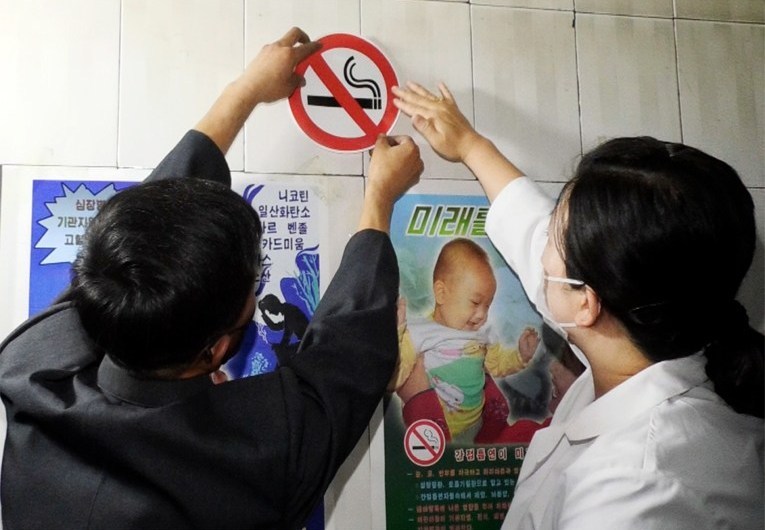N. Korea bans smoking in restaurants, bus stops and public squares
By YonhapPublished : Dec. 11, 2020 - 09:51

North Korea has designated restaurants, bus stops, public squares and other venues as nonsmoking areas after adopting an anti-smoking law last month, a propaganda outlet said Friday.
DPRK Today, one of the North's propaganda websites, pointed out that smoking is banned in several public spaces, including hotels, stores, restaurants, public baths, cinemas, libraries, gymnasiums, public squares and (bus) stops.
Also designated as nonsmoking areas are ideological education centers, nurseries, schools, medical facilities, public transportation and other places prone to fire and explosions such as forests and gas supply stations.
The anti-smoking law applies to foreigners in North Korea, as well as local institutions, factories and individuals, according to the outlet. No-smoking signs will be put up in the designated venues, it said.
"Tightening control over smoking is an important requirement in protecting the lives and health of the people," the outlet added.
On Nov. 4, North Korea held a meeting of the Presidium of the Supreme People's Assembly and adopted an anti-smoking law that specifies places and buildings where smoking is prohibited.
The newly adopted law, however, raised questions about whether it would also be applied to North Korean leader Kim Jong-un, known as a heavy smoker. State media frequently runs photos of him carrying cigarettes in public.
After the anti-smoking law was adopted, he was seen next to a cigarette pack and ashtray while presiding over a politburo meeting of the Workers' Party last month.
Overall smoking rates in North Korea remain high. According to a report, smoking rates especially among men in the North stood at 43.9 percent in 2014. (Yonhap)
DPRK Today, one of the North's propaganda websites, pointed out that smoking is banned in several public spaces, including hotels, stores, restaurants, public baths, cinemas, libraries, gymnasiums, public squares and (bus) stops.
Also designated as nonsmoking areas are ideological education centers, nurseries, schools, medical facilities, public transportation and other places prone to fire and explosions such as forests and gas supply stations.
The anti-smoking law applies to foreigners in North Korea, as well as local institutions, factories and individuals, according to the outlet. No-smoking signs will be put up in the designated venues, it said.
"Tightening control over smoking is an important requirement in protecting the lives and health of the people," the outlet added.
On Nov. 4, North Korea held a meeting of the Presidium of the Supreme People's Assembly and adopted an anti-smoking law that specifies places and buildings where smoking is prohibited.
The newly adopted law, however, raised questions about whether it would also be applied to North Korean leader Kim Jong-un, known as a heavy smoker. State media frequently runs photos of him carrying cigarettes in public.
After the anti-smoking law was adopted, he was seen next to a cigarette pack and ashtray while presiding over a politburo meeting of the Workers' Party last month.
Overall smoking rates in North Korea remain high. According to a report, smoking rates especially among men in the North stood at 43.9 percent in 2014. (Yonhap)





![[From the Scene] Monks, Buddhists hail return of remains of Buddhas](http://res.heraldm.com/phpwas/restmb_idxmake.php?idx=644&simg=/content/image/2024/04/19/20240419050617_0.jpg&u=20240419175937)





![[Graphic News] French bulldog most popular breed in US, Maltese most popular in Korea](http://res.heraldm.com/phpwas/restmb_idxmake.php?idx=644&simg=/content/image/2024/04/18/20240418050864_0.gif&u=)



![[From the Scene] Monks, Buddhists hail return of remains of Buddhas](http://res.heraldm.com/phpwas/restmb_idxmake.php?idx=652&simg=/content/image/2024/04/19/20240419050617_0.jpg&u=20240419175937)

![[KH Explains] Hyundai's full hybrid edge to pay off amid slow transition to pure EVs](http://res.heraldm.com/phpwas/restmb_idxmake.php?idx=652&simg=/content/image/2024/04/18/20240418050645_0.jpg&u=20240419100350)

![[Today’s K-pop] Illit drops debut single remix](http://res.heraldm.com/phpwas/restmb_idxmake.php?idx=642&simg=/content/image/2024/04/19/20240419050612_0.jpg&u=)